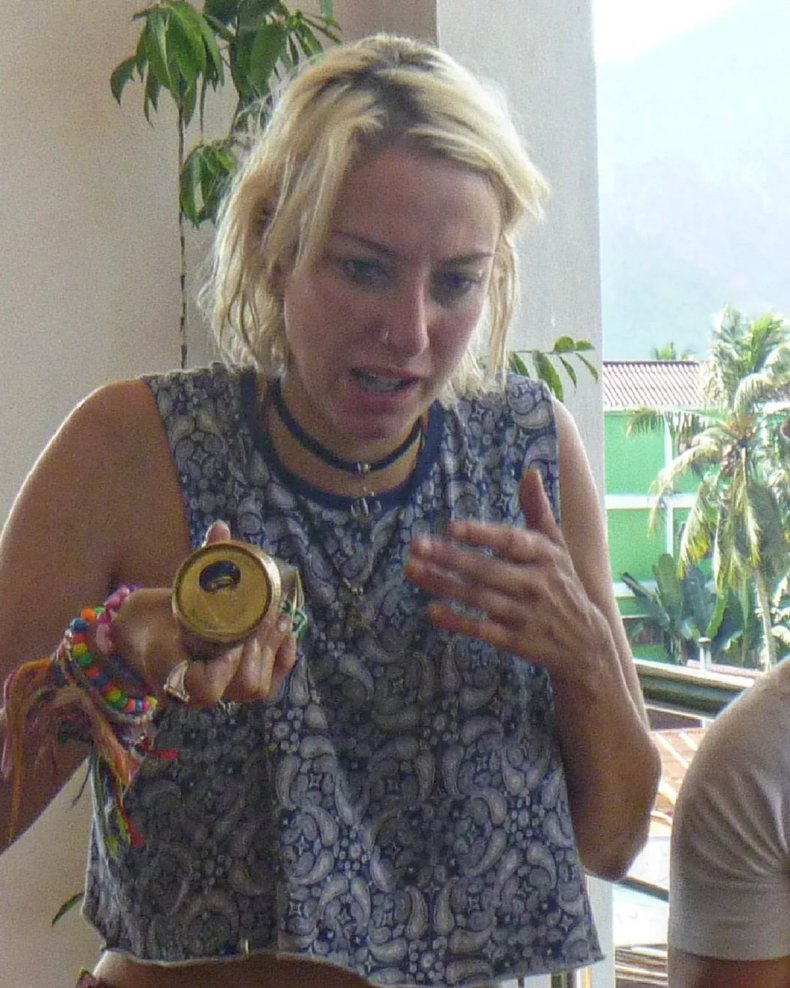At the time of writing, Abi Feltham, a successful 35-year-old social media marketer from southeast England, has just come home from a two-week holiday in sunny Albania with her partner. But in 2020, she was an active alcoholic, smoking crack cocaine and recovering from a suicide attempt.
“I’ve had a lot of substance abuse issues over the years, but alcohol is the worst,” Feltham told Newsweek, “I am completely powerless over alcohol, once I take the first drink all bets are off, that’s when I lose control.”
Substance Use Disorder affects more than 20 million Americans over 12 years old, and it does not discriminate. Anyone, anywhere, anytime can succumb and the stigma can be impossible to bear, often getting in the way of recovery.
After spending 10 years traveling the world, living out of a backpack and running away from her problems, Feltham was forced to come home when the pandemic hit, and she had to face her demons head on.
Connecticut addiction recovery charity Shatterproof reported that the biggest obstacle in the way of an addict’s recovery, whether it’s alcohol or prescription drugs, is the stigma.
“Stigma runs deep,” Lisa Kugler, senior vice president of Shatterproof and a doctor of psychology, told Newsweek, “and can perpetuate a person to feel badly about themselves and therefore potentially not believe that they can benefit from treatment or believe that they are not worthy to receive the assistance.”
What Is Substance Use Disorder?
Having struggled for a long time with a plethora of mental health issues including depression, low self-esteem and low self-worth, Feltham began drinking at 13.
“As a teenager I was really lonely and felt very misunderstood,” she told Newsweek, “The environment where I grew up was quite unloving and I felt very different to my peers. I felt the world didn’t understand me and I didn’t understand the world, but when I started drinking, all those feelings went away and I felt I could move through the world like ‘normal’ people. Everything was a struggle for me until I started drinking, and I just carried on chasing that feeling, almost like a safety net. Then I carried on that behavior until I became fully addicted to alcohol.”
Denial and justification are integral parts of Substance Use Disorder, and along with stigma, can be some of the biggest barriers to seeking help.
Substance Use Disorder is an extremely subjective disease that affects a person’s brain and behavior and leads to an inability to control the use of substances, such as legal and illegal drugs and alcohol.
“Some of the underlying issues include genetics, childhood trauma and mental health concerns. Despite these underlying issues, recovery is possible,” said Kugler.

Abi Feltham
“In my teens and twenties,” said Feltham. “I justified drinking by telling myself, ‘I’m young, this is what you do.’ I remember seeing the movie American Beauty and the Mena Suvari character who wanted to be famous said, ‘I can’t think of anything worse than being ordinary,’ and I really attached myself to that. I didn’t want to be ‘boring.’ I wanted to have as many adventures as possible and give my life meaning and I believed going out, partying, taking drugs, having meaningless sex and putting myself in potentially dangerous situations was how you lived a fulfilled life with lots of cool stories.”
The Realities of Substance Use Disorder
Loneliness and alcoholism go hand in hand, and although many people with Substance Use Disorder might be the life and soul of the party, behind closed doors it may be a very different story. While traveling Southeast Asia and working as a bartender and party organizer, it was easy for Feltham to hide her problems from herself and others due to the party lifestyle and transient nature of the company she kept.
“I had the worst year of my life in 2019,” Feltham told Newsweek. “I met a guy in Southeast Asia and we fell in love and moved to the U.S, where it became quickly apparent that I was not the barefoot, carefree hippie chick he met on the beach, but rather a severely depressed alcoholic. I was so lonely, I thought a change of place would cure me but it turned out no matter where I went in the world, I was going to be lonely.”
One day, in the middle of the night, Feltham described how her boyfriend put her on a plane to Canada, no longer able to cope. “We had a mutual friend there,” she said. “They took me in and I started working at a fast food place. Normally when people are trying to get over a breakup they get a new haircut, buy a new wardrobe. I started smoking crack. I went on a horrific four-month drug binge before moving to a trailer in Vancouver, running away again.”
According to the National Institute on Alcohol Abuse and Alcoholism, alcohol contributes to 18.5 percent of emergency department visits and 22.1 percent of overdose deaths related to prescription opioids. An estimated 95,000 people die from alcohol-related causes annually, making alcohol the third leading preventable cause of death in the United States behind smoking and nutrition.
One tactic people dealing with Substance Use Disorder employ is to bargain with themselves. “I got to the point where I hated drinking but I couldn’t stop. I was doing a lot of bargaining with myself which I now know is a key sign that you have an unhealthy relationship with alcohol,” said Feltham. “Every morning I’d say ‘things will be different today’, but by midday I’d be drinking again, and I hated myself and I hated drinking.”
In 2019 alone, 47,500 Americans lost their lives to suicide and, as the Alcohol Rehab Guide reports, nearly a third of suicide deaths have been linked to alcohol consumption.
It was at this time in 2019 that things took an extreme turn for Feltham, but not enough to stop the drinking. “I was very sad and lonely, living in a trailer and working at a barbecue place and I didn’t care if I lived or died. It wasn’t the first time I had had suicidal thoughts, but this time I went through with it. I would have succeeded if I hadn’t been found and taken to a psych ward in Canada. As soon as I was discharged I went to the liquor store. I had accepted that I was an alcoholic, that was all I was ever going to be so I may as well continue.”
The Road to Recovery
Feltham’s road to recovery began with the pandemic in 2020. “That was the catalyst for change for me,” she said. “The pandemic was a really difficult time for a lot of people, but for me it was a time for transformation.” The pandemic forced Feltham to move back to the U.K., something she had long considered a last resort, “I tried to kill myself rather than come home,” she said. “I went back to my mum’s house, to the bedroom I grew up in, and obviously carried on drinking as soon as I got there, hiding my bottles down the side of my bed like I did as a teenager.”
The Substance Abuse and Mental Health Services Administration defines recovery as: “A process of change through which individuals improve their health and wellness, live a self-directed life, and strive to reach their full potential.” Kugler told Newsweek. “When using this definition, approximately 75 percent of individuals eventually reach a level of recovery with approximately 80 percent of the individuals who achieve a level of recovery accomplishing at least one major achievement associated with self-improvement and/or family engagement.”

Abi Feltham
It was this full-circle life event that made Feltham pay attention for the first time. “It was the strangest thing,” she said. “Even though I’d lost my relationship, my job, been smoking crack, tried to kill myself, none of those had been my wake-up call.
“But some random morning, I was sitting on the end of my bed in my mother’s house after a two-week bender, and I had what I can only describe as an epiphany.
“I just knew in that moment that it was alcohol, and if I removed alcohol from my life then things might get better. It was such a moment of surrender, something I had considered a failure before.”
According to the American Addiction Centers, going cold turkey from alcohol can cause a range of symptoms including heart palpitations, high blood pressure and insomnia, but it can also cause more serious issues if unmonitored, including violent seizures, delirium tremens, and possibly death.
On a lighter note, when Feltham shared her news with her friends and family they believed it was an April Fool’s joke, rather than a serious commitment to sobriety. Despite the date, Feltham has not had a drink since April 1, 2020.
What Does the Future Hold?
Removing the stigma surrounding addiction is key to encouraging more people to come forward and seek help, Kugler said. “What the public should know is that addiction is a treatable disease, not a weakness,” she added. “For someone to seek services, the community has to be accepting of the individual and acknowledge how difficult it is to ask for assistance. By changing people’s attitudes and behaviors, we are reducing the shame in order to encourage patients to seek life-saving treatment.”
Another way that addiction awareness and treatment encouragement is improving, according to Kugler, is that people like Feltham are sharing their stories. “This makes it all right for others to share their stories and for realistic hope to abound. Having a belief that recovery is possible is one of the first steps in addressing the devastating impacts of addiction,” she said.
Many of Feltham’s videos on social media have a comical edge to cut through the serious subject matter, something that she took comfort in at the beginning of her recovery journey.
“I remember when I first got sober, I unfollowed all the bars and party pages on social media and typed in ‘sober’ and there were loads of memes where people were making fun of themselves for having these really serious problems. I found it so comforting because these people were able to see the light side of the dark. It made me feel safe and less like a freak. I’d spent enough time with my dark thoughts, and it was time to flip the script.”
Feltham now lives in a leafy suburb of London with her boyfriend and works in social media for a marketing agency, a job she secured through her own social media videos about recovery.
“If I had one piece of advice for anyone struggling with addiction it’s to be honest with the people around you, that’s what helped me the most,” said Feltham. “I hid my problems from other people for so long, and in hiding my problems I hid them from myself. Be honest with those around you, share your experiences because no matter your relationship with alcohol, all experiences are valid. Through sharing how you feel and what you think about the impact alcohol is having on you, you’re opening yourself up to a solution.”
If you have a personal dilemma, let us know via [email protected]. We can ask experts for advice on relationships, family, friends, money and work and your story could be featured on Newsweek’s “What Should I Do? section.


